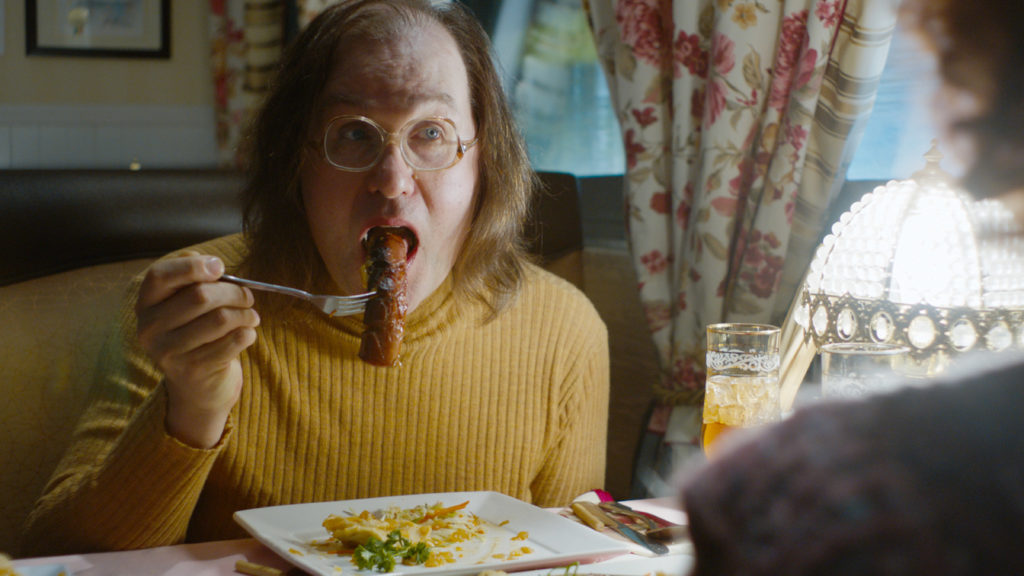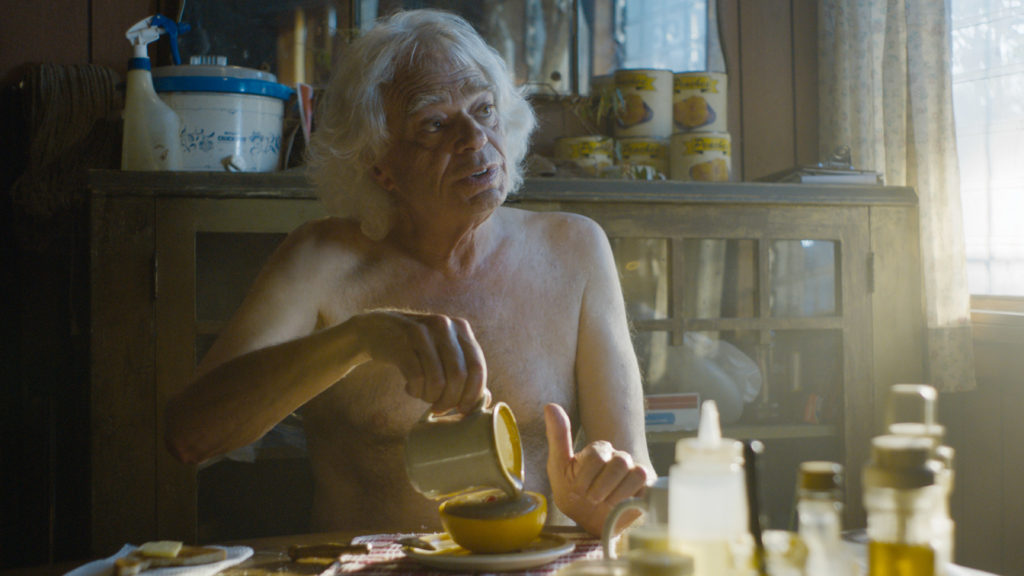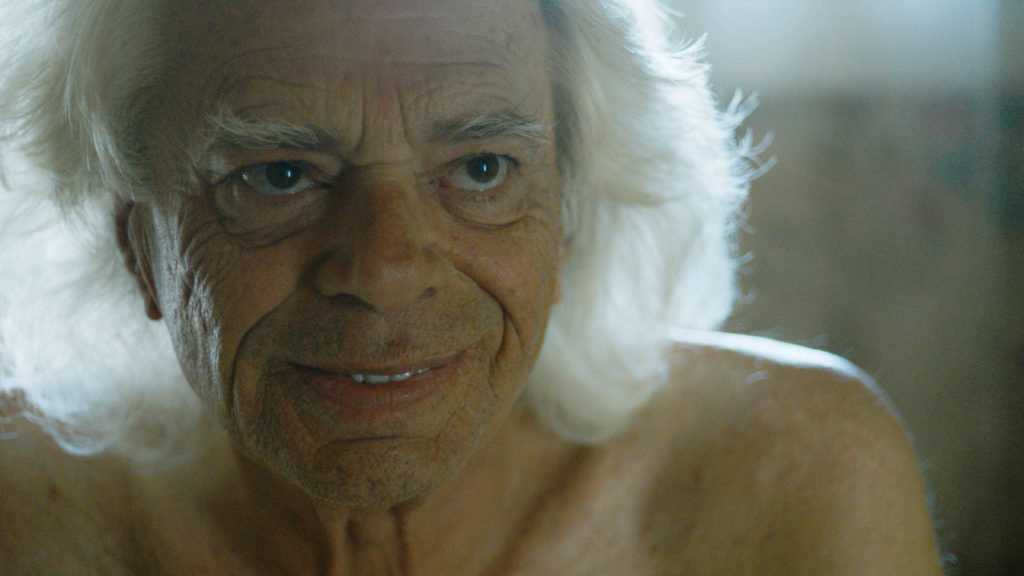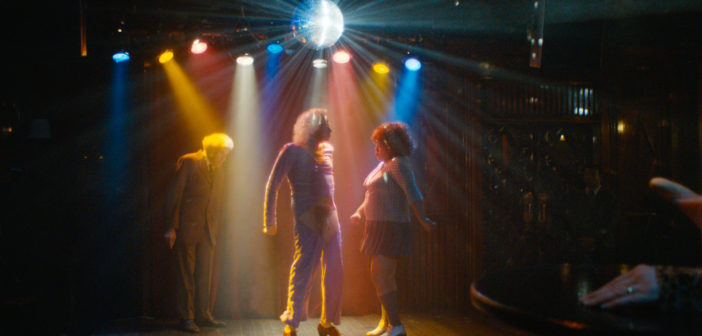The Greasy Strangler was one of the surprise films of 2016. Premiering to thrills of disgust at Sundance, it snuck into Australia late last year as a part of MonsterFest 2016. Monster Pictures have just released the film in several formats (not on VHS unfortunately) and were happy to throw a few questions in front of Greasy director Jim Hosking for Cyclic Defrost. It’s no secret that Cyclic Defrost are huge fans of the film, and I am going to stand on the top of this greasy mountain and proclaim it’s merits until everybody has seen it. Well, I probably won’t, but if you can find a greasy mountain for me to proclaim from please let me know.
I recently reviewed the Monster Picture’s double BluRay edition, so pop over here to read that, but please, pretty please with lots of grease on top, go and watch the film first. This interview contains spoilers, so consider yourself warned and proceed with greasy caution.
Cyclic Defrost: When I first watched The Greasy Strangler I was taken completely by surprise. I had absolutely no idea what to expect and I wasn’t really prepared for it. It took me a little while to get my head around it, the scenes seemed too long, the music was bizarre, the dialogue was strange. I think when I got to the “potato” scene it all fell into place for me. The tone of the film is remarkable, how did you go about approaching such a story in such a bittersweet yet comedic tone?
Jim Hosking: I wanted to cast loveable childlike characters. I wanted the film to feel almost like we were trying to make a sweet kids’ film but we just got the subject matter a bit wrong. So the film has a gentle sweetness to it that enhances the depravity. I think that’s why some people find the film disturbing: because it’s not dark, it’s actually quite light and fluffy. There’s a lot of fluffy hair in the film. Did you notice that?
CD: Yes, fluffy hair and amazing costumes. To me The Greasy Strangler was the best film of 2016. I tell everyone I know to watch it. What were your expectations from the film? Were you surprised by the reception it has received?
JH: I was surprised that anybody found the film gross or disgusting. I find that really strange. If you are a regular person who has sex, digests food, excretes food, washes your body and all its orifices thoroughly every day then I don’t understand what is disturbing about this film. It has no graphic violence, no rape, no torture, no menace. It has a bit of fruity dialogue, some prosthetic genitals, and some cartoonish visual FX. This is what makes it the most fucked up film of the year dudes!
CD: The Greasy Strangler is a very unique film. The only other cinematic references I can compare it with would be the works of Quentin Dupieux, or perhaps the dark absurdity of Chris Morris. I was wondering how you see The Greasy Strangler fitting into the broader screen world?
JH: Some people have compared the film to John Waters. But I’m more into the Pink Panther, Wallace and Gromit, Wild At Heart and Bergman’s Scenes From A Marriage. But saying this I wanted my film to not be ‘like’ anything else. It’s more like a comic or a cartoon I think.
CD: For all of it’s absurdity The Greasy Strangler is a heartfelt story about a father and son, about rejection and acceptance. Were the acts of violence committed throughout the film intended to be seen as a transgressive response to familial bonding, or did it simply come from an attempt to write some outlandish characters and scenarios?
JH: I think the acts of violence were necessary because the film was always going to be about a greasy strangler. But yes, the film is really more about a father and a son and their peculiar relationship with each other and their relationship with the one woman that is in the film. I didn’t try to make the film violent or outlandish, I just tried to make something funny and touching and sad. I think the acts of violence are kind of silly really, but played with the utmost sincerity!

CD: The most surreal scene in the film is where Big Ronnie and Big Brayden watch themselves being executed. Obviously this is left in an ambiguous state. To me it speaks of their new lives, their new familiar connection, leaving their old selves behind. I don’t want to push you for explanation, as I think the beauty of it is in the audience’s interpretation. Would you care to comment on that scene at all?
JH: Well, it’s funny that the scene confuses some people. To me it felt very clear. I think the joy is to watch it and form your own conclusions much as you have. I like your interpretation of it. Honestly sometimes other people’s interpretations can be very enlightening!
CD: I have read that you wanted not well known actors in The Greasy Strangler. I think this really helped to create the unique world in which the film dwells. Another aspect of that was the acceptance of different body shapes that we are used to seeing in cinema. The Greasy Strangler could be seen as advocating for “normal” bodies on screen. Was this a deliberate choice?
JH: Yes that’s a totally deliberate choice. I didn’t want the film to feel ‘sexy’ or exploitative. That’s what takes me out of most films. I wanted the casting to be notable and remarkable. The word remarkable meaning that people remark on the casting, and they do. But I wanted it to be remarkable because it was a refreshing change from the usual predictable casting choices. It’s strange how people have written about the film and talked about flabby arses and saggy bodies. It’s very strange that normal bodies are not acceptable and have to be vilified. How utterly pathetic!
CD: Janet is the only female character in the film. In the BluRay commentary you mention that in the Big Brayden/Janet date scene you removed a female extra in post, creating a world where Janet is the only woman. I was wondering about your decision to do this. Some criticism I have read has suggested The Greasy Strangler is misogynistic (something that I don’t agree with), but it is a particularly strange male-dominated world you have created. Could you elaborate on this a little please?
JH: Janet is the smartest character in the film. She’s as devious and manipulative as anybody else. She’s funny too. Her currency is stronger when she is the only female in the film. That’s why Brayden and Ronnie are obsessed with her. It’s like they’ve never met or seen a woman before. Anybody can say anything on the Internet. But that doesn’t make it worth saying or reading.

CD: This was your first feature film. You have discussed how the original cut was over two hours long, and there are several extended scenes included on the BluRay release that are much longer than in the final cut, as well as more backstory dealing with Janet. It seems like there was a lot more exposition in the original script, and I think the film probably works better by removing that, and just allowing the strangeness to exist. Can you talk about the process of cutting down the film, and how the transition from script to screen changed the way you saw the film and the characters?
JH: One of my producers said to me ‘there’s only so much of this that people can take’ when he watched the longer cut. And I agreed at the time. I watched the first assembly with glee and then ultimately with my head in my hands. It felt like the film had been made by someone with serious mental issues! I actually love unnecessary exposition, pointless dialogue, characters saying what they’re about to do. It’s what life is like. But it just felt too long at the time. Though now I kind of wish I’d pushed it a bit more, maybe had an extra ten or fifteen minutes. The film works best when it keeps on keeping on. Cutting down the film was laborious and difficult. But some scenes felt like the most obvious to go. You just know what you are least keen to lose and most able to cut. Everything evolves after the script is written. The script is just a reference. It all changes as you cast and costume and plot shots and scout locations. But I always wanted the film to be sweet and childlike, not dark and menacing. Anybody who finds this film disturbing is a snivelling wuss!
CD: You use the word “cartoon” to describe many aspects of The Greasy Strangler, from the costumes, to the violence and even the soundtrack. The film does have it’s own sense of internal logic, like a cartoon, and to me this is one of the greatest strengths of the film. Obviously the script is ridiculous, and is for the most part played quite straight. All of the characters are quite grounded (I know, it’s a strange term to use in relation to this film) except for Big Ronnie, who has more fantasy elements – seeing Janet walking away naked, the spotlight dance scene etc. Was your original vision for the film to be as irreverent as it turned out, or did you imagine something more “realistic”?
JH: I always imagined it would look like another world but I don’t feel the need to get into too many specifics when writing it. It’s just a feeling, with definite strong images… I always imagined Oinker wearing shorts. But then I always imagined the hot dog vendor would be Nigerian. Of course the film was meant to be irreverent. Honestly I wanted the film to be a lot more irreverent than it ended up being. I wanted the stranglers to be genuinely naked and covered in porridgey grease. I wasn’t interested in it being remotely realistic. It maybe became a bit more brightly coloured than I originally intended. I imagined something sadder and grubbier.
CD: Can you tell me a little about Carl Solomon, who in the commentary you say was originally going to play Big Ronnie. He pops up many times throughout the film, bit I never would have known if you hadn’t discussed it in the commentary. Who is Carl?
JH: I cast Carl in a short film Crabs that I made. He makes me laugh a lot. It’s something to do with his face and his voice and his posture and his unflinching desire for a line of dialogue in a Hollywood movie production. But I feel maybe I’ve finally got Carl out of my system. Hopefully Carl doesn’t read this.

CD: You’ve spoken in many interviews about the soundtrack by Andrew Hung, but it is one of the things about the film that really makes it unique. I’ve read that you discussed weird mouse voice cartoon music with Andrew, and the way that turned out really sets the film apart. I had to buy the soundtrack, it is so good. The cheesy Casio style music really matches the tone of the film, but I know you were using Miles Davis as a reference, which is stylistically very different. Andrew’s score is still somewhat funky, but not in a classic way. It is demented and wrong, which is why it is so good. How collaborative was the process with Andrew? Did you work together to create the tone?
JH: I had conversations with Andy about how I saw it. He produced a lot of simple tunes and loops to start with. I told him which I liked. He developed these, and generally he just made music that was perfect for the film. If I had had any musical imagination then it’s where I would have taken it, but really he took it there. I just gave him a little push. He was on a bike. And I gave him a tiny little push. I actually put a track of his called Fables to picture early on when I was cutting, and it worked perfectly. That’s where the inspiration came from.
CD: I have read that your next project is a romantic comedy. I am very keen to see what you make next. Would you like to discuss your next project at all, or is it under wraps for now?
JH: Well, the new film is likely to be called An Evening With Beverly Luff Linn. It’s definitely got romance in it and hopefully some comedy. I’m editing it at the moment. My desire is to make people laugh and cry with this film. But if I can’t do both then I’ll settle for one. I’m also moving in a slightly different direction, I don’t want to repeat myself. Although there will be a few familiar faces in the film.
CD: With An Evening With Beverly Luff Linn you have been working with a much more well known cast. How has that been compared with the relative unknowns of The Greasy Stranger? Has there been more pressure on you as the follow up, and has working with more well-known actors changed the way you work? I must say the cast list is very exciting to me, and I cannot wait to see what you come up with next.
JH: It’s just very different this time around. I’m used to being a bit more bossy and micromanaging people more. With the new film I gave the actors a lot of space to bring their ideas, maybe at times some of them might have felt I gave them too much space, but it was a learning process for me. I loved it. It was actually the most I’ve learned when working. And I feel I’m going to head in a whole new direction now. Maybe no more comedy. Or at least for a while. I’ve got the urge to go somewhere darker and mucho mysterioso!
CD: One final question, what the hell is the deal with Oinker’s nose cavity?!
JH: It’s got piggy juice in it. What the hell did you expect?????




